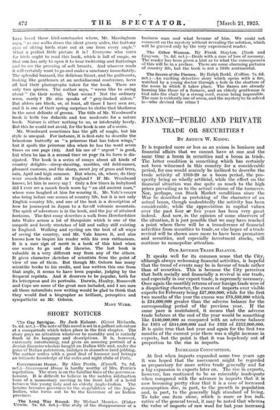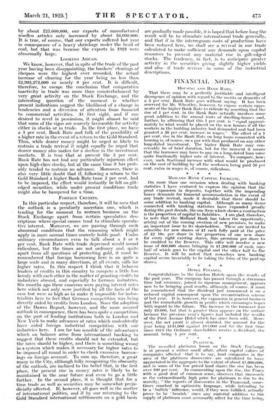FINANCE-PUBLIC AND PRIVATE
TRADE OR SECURITIES ?
BY ARTHUR W. KIDDY.
IT is regarded more or less as an axiom in business and financial affairs that we cannot have at one and the same time a boom in securities and a boom in trade. The latter condition is something which has certainly not been witnessed in this country for a considerable period, for one would scarcely be inclined to describe the trade activity of 1919-20 as a boom period, the pro- Sperity being so wholly artificial, while the effect on the financial situation was due quite as much to the high prices prevailing as to the actual volume of the- turnover. Nor, perhaps, can Stock Market conditions since the War be described as partaking of the character of an actual boom, though undoubtedly the activity has been considerable, while the appreciation in capital values over the past four or five years has been very great indeed. And now, in the opinion of some observers of the situation, it is just possible that we may have reached a point where there will be a transference of financial activities from securities to trade, or else hopes of a trade revival will be shown once more to have been preMatiire and securities, and especially investment stocks, will continue to monopolize attention.
OUR ADVERSE TRADE BALANCE.
It speaks well for its common sense that the City, although always welcoming financial activities, is hopeful that the trend of events may be in favour of trade rather than of securities. This is because the City perceives that both socially and financially a revival in our trade, and especially in our export trade, is supremely necessary. Once again the monthly returns dour foreign.trade were of a disquieting character, the excess of imports over visible exports for February being £27,000,000; while for the first two months of the year the excess was £73,583,000 which is f.34,000,000 greater than the adverse balance for the corresponding period of the previous year. If the same pace is maintained, it means that the adverse trade balance at the end of the year would be something like £440,000,000 as compared with an adverse balance for 1924 of E.344,000,000 and for 1923 of £212,000,000. It is quite true that last year and again -for the first two months of the current year there was a slight increase in exports, but the point is that it was hopelessly out of proportion to the rise in imports.
INCREASED CONSUMPTION.
At first when imports expanded some two years ago it was hoped that the movement might be regarded as preparatory for more active trade generally and for a big expansion in exports later on. The rise in exports, however, has continued to be so miserably inadequate when compared with the advanee in imports that it is now becoming pretty clear that it is a case of increased consumption due, .in part, to the growth in population and, in part, to the generally high standard of living. To take one item alone, which is 'more or less indi- cative of the general trend, it may be noted that whereas the value of imports of raw wool for last year increased by about £25,000,000, our exports of manufactured woollen articles only increased by about £6,000,000. It is true, of course, that our exports suffered last year in consequence of a heavy shrinkage under the head of coal, but ,that was because the exports in 1923 were abnormally large.
LOOKING AHEAD.
We know, however, that in spite of the trade of the past year having been disappointing, the bankers' clearings of cheques were the highest ever • recorded, -.the actual increase of clearing for the year being no less than £2,905,272,000 or nearly 8 per cent. It is difficult, therefore, to escape the conclusion that comparative inactivity in trade was more than counterbalanced by very great activity on the Stock Exchange, and the interesting question of the moment is whether present indications suggest the likelihood of a change in tendencies and a diversion of attention from financial to commercial activities. At first sight, and if one desired to revel in pessimism, it: might • almost be said that some of the signs are scarcely favourable for activity either in stocks or in trade. In the first place, we have a 5. per cent. Bank Rate and talk of the possibility of a higher rate in the event of a return to the Gold Standard. Thus, while dearer money might be urged as likely to restrain a trade revival it might equally be urged that dearer money also makes for a decline in the investment markets. It is true that at present the 5 per cent. Bank Rate has not had any particularly injurious effect upon high-class stocks, but at the same time it has prob- ably tended to restrain an advance. Moreover, there is also very little doubt that if, following a return to the Gold Standard a higher Bank Rate, tnan 5 per cent. had to be imposed, the effect would instantly be felt on gilt- edged securities, while under present conditions trade might also be hampered for a time.
FOREIGN CREDITS.
In this particular respect, therefore, it will be seen that the outlook is a peculiarly uncertain one, which is tending for the moment to restrain business on- the Stock Exchange apart from certain speculative des- criptions -where special causes tend to stimulate specula- tive interest. Moreover, we are passing through such abnormal conditions that the reasoning which might apply in more normal times scarcely holds good. Under ordinary circumstances even to talk about a 5 or 6 per cent. Bank Rate with trade depressed would sound ridiculous, but the times arc not ordinary and, quite apart from all questions of protecting gold, it must be remembered that foreign borrowing here is on quite a large scale and in many directions, at all events, calls for higher rates. In this respect. I think that it behoves lenders of credits in this country to compete a little less keenly with each other in the matter of granting credits to industries abroad, and especially to German industries. Six months ago these concerns were paying interest rates here which not only were justified by all the facts of the case but were so- high as to make it impossible for indus- trialists here to feel that German competition was being directly aided by credits from London. Since the adoption of the Dawes Report, however, and the more assured outlook in consequence, there has been quite a competition on the part of lending institutions both in London and New York to make advances at rates which undoubtedly have aided foreign industrial competition with our industries here. I am far too sensible of the advantages which on balance arise from international banking to suggest that these credits should not be extended, but the rates should be higher, and there is something wrong in a system which makes it necessary for higher rates to be imposed all round in order to check excessive borrow- ings on foreign account. To sum up, therefore, a great many in the City, although-fully, recognizing the obscurity of the outlook, are inclined to the belief that, in the first place, the present .rise in money rates is likely to be maintained in the near futitre and even to go a little further. -In the second place, it is thought that for a time trade as well as securities may be somewhat preju- dicially affected. It-however, all goes well in the matter of international politics, and if by our returning to the Gold Standard international settlements on a gold basis are gradually made possible, it is hoped that before long the result will be to stimulate international trade generally, and that if in the interregnum costs of production have been reduced here, we shall see a revival in our trade calculated to make sufficient any demands upon capital resources to prevent any material rise in gilt-edged stocks. The tendency, in fact, is to anticipate greater activity in the securities giving slightly higher yields and also—if trade revives— in some of the industrial descriptions.























































 Previous page
Previous page